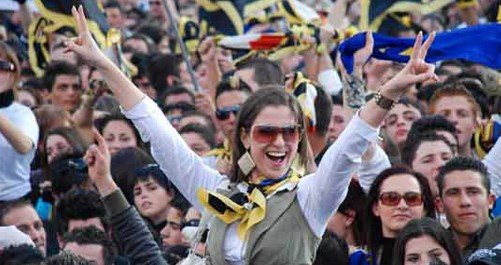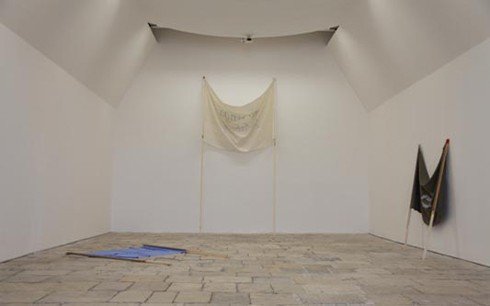The birth of a generation
The Maltese young adults of today were born around the eighties. Everything was state-controlled and those who dared stand-up to Dom Mintoff's and later Karmenu Mifsud Bonnici's socialist government were liable to abuse by fanatic thugs. Political turmoil led to violence in the streets some also paying with their lives for their beliefs.
Culture took the form of festivals like 'Warda Kanta' (lit. trans. Singing Rose) or 'Gensna' (Our Nation) where kitschy (even by 80s standards) ballads exulted the values of the hard-working Maltese and celebrated the achievements of this young nation's great fathers whose courage, blood and perseverance ultimately paid off by Mintoff's 'expulsion' of the British in 1979 and Malta became a republic.
Change and development
The acute political tension between 'Mintoffians' (Labour supporters) and 'Nazzjonalisti' (Nationalists), the stringent economy, the teachers' and doctors' strikes and the violent rivalries between adherents of the two parties are somehow little talked about by Maltese youths. Could this be a sign of a collective amnesic apathy where the young cannot be bothered to look back and learn from their country's past? Were these events wilfully forgotten by a generation that grew up in the general sense of optimism and subsequent comfort that prevailed in the 90s?
One way of understanding this is to accept that young adults today seem to have only few, faint memories of the hardships experienced a decade earlier because most of them were simply too young then to remember.
Young now
Today's young people have shown less inclination towards political fanaticism and although the phenomenon still exists, it is far from the extreme levels prevailing in the late 70s and 80s.
Nonetheless, in the last general elections of 2008 the voter turnout was 93% - one of the highest in Europe but the lowest for the country since 1971.
In theory it is very healthy that the majority of the people are directly involved with the democratic process but the reality behind it is much more complex. A number of questions arise; How are people choosing their representatives? Who or what is influencing their choices in the polling booth? What do young people and first-time voters make out of the current political situation? What are the issues that they debate and make their choices on? How discerning are they?
While it is true that young people today are more open to discussion and less susceptible to peer and family pressures than their parents were back in the 70s and 80s, their access to clear, politically unbiased information about current issues is still limited. A clear example of this is the way issues like the hotly debated EU ascension, the building of the new Mater Dei hospital or divorce were politicised and then presented in the local media.
Media matters
The three main television stations in Malta are the state owned TVM (Television Malta), the PN's (Partit Nazzjonalista / the Nationalist Party) Net television and One productions owned by the PL (Partit Laburista / the Malta Labour Party) and a very similar situation is found in the print media. Consequently the information which reaches the man on the street is rarely, if ever, unbiased by the interests of the opposing parties.
Independent newspapers like MaltaToday often challenge the two-party system by exposing cases of corruption and shady connections between party members, political appointees, politicians and key businessmen, denouncing nepotism, the lack of transparency in governance, the retrograde libel laws used to silence critics and the disregard for meritocracy in filling key official posts. They also champion the cause of the green lobbyists and act as a much needed platform for other minorities and independent voices.
Home computers, mobile telephony, cable television and the internet have redefined the way-of-living not only of the young but of the Maltese in general. Though some discrepancies remain, almost every household in Malta is online today, and the Island has its own little army of young facebookers, bloggers and world-wide-web wizards.
Business and economy
Money is the subject on everyone's lips and tops the priorities of young and old in Malta. Today the country's economy seems to have come back full circle and the people are being reminded that at times spending restraint is necessary. On the 27th January of this year the EU executive extended Malta's period by one year in which it is to contain its budget deficit according to the 3% limit set for EU members. This extension was granted due to the "significant worsening of the economic situation". It is projected that by the end of 2010 the deficit is brought down to 3.9%. The recession has contributed to add stress to the already precarious state of the economy with job losses in key industries such as manufacturing, construction and tourism also contributing to further this unhappy situation.
The liberalisation of the economy and the privatisation of most state owned companies such as TeleMalta, the Malta Shipyards and Mid-Med bank have become symbols of the PN's will to open and diversify the economy. The government has managed to establish ties with major international companies such as Lufthansa Technik, Microsoft and TECOM Investments and Sama Dubai, partnering with the latter to build SmartCity Malta, a 'state-of-the-art' (a favourite phrase with the PN's media) technology park and there was much ado about the 6,000 new jobs which it is meant to generate.
The project has been at the centre of controversy since it was officially launched in September 2007, less than six months before general elections. With the recession and the resignation of its top management, Smart City Malta today seems like an unattainable project. But how does all of this effect Maltese youths?
Finding alternatives
SmartCity is by far the most ambitious of projects (except perhaps the Mater Dei Hospital) undertaken in the last few years and completely in line with the ambition to boost the information and communication technology industries. The Malta College for the Arts, Science and Technology (MCAST) seems to have been purposely set-up to supply skilled workers for the forecasted jobs. What will all those students who have been 'advised' to pursue studies in ICT and the related fields do upon graduation if the project fails?
The promise of a secure well-paying job has in the last decade pushed young students towards the financial sector (in last October's graduation ceremony at the University of Malta 661, out of the 2734 graduates for 2008/09, were from the Faculty of Economics, Management and Accountancy) but what will all these graduates do when the market for accountants, auditors and economists is saturated? What solutions are graduates seeking to find employment within their fields of study? What support and assistance is being provided to these new specialist workers to explore alternative fields of employment? Government entities like the Employment and Training Corporation (ETC) and MCAST do provide guidance and specific courses in entrepreneurship but relatively few are those graduates who opt for such courses preferring instead to explore employment possibilities in foreign countries.
Many other graduates particularly from the fields of medicine and finance have opted to move to English speaking countries mainly the UK. Others have taken the advantage of Malta's joining the EU and sought translation jobs in either Brussels or Luxembourg. Observers in the local media have warned about the brain-drain but creating opportunities and improving work conditions in the current recession is difficult.
Education and employability
Open-door policies, emotionally engaged students, formal and non-formal learning opportunities, greater inclusiveness, mixed abilities classes, equal opportunities, second-opportunity schools, learning support assistants, pro-activity ... all of these compose the compendium of buzz words used in describing the changes that the educational system is undergoing. All are interesting concepts but what are the results being yielded by this open, less academically oriented form of schooling? How are young people benefiting from these changes? How are these new skills easing the youths' transition from secondary school to vocational training to the workplace?
Most educators seem to agree with revisions in the education system but many are suspect of the new 'pressure' to increase numbers in the classroom and retention, namely due to Malta's commitment to the Lisbon Agenda which requires that by the end of this year 85% of students continue to further their studies in 'post-secondary vocational educational facilities'. Teachers at post-secondary level, mainly those specialized in the vocational sector like MCAST are seeing this more as a political move where quantity matters more than quality, than a genuine attempt to improve young people's lives.
Job expectations and mobility
Figures from last year show that MCAST had a population of almost 10,000 students in between part-time and full-time courses, roughly equaling the numbers at University. Unfortunately there are no accurate official statistics showing whether graduates from both institutions find employment within their respective areas of specialization and less so whether the job they find is up to their expectations.
In the absence of such figures it is interesting to compare the greater freedom with which young Maltese adults change jobs today, to the more persevering attitude shown by previous generations of young workers. The latter tended to establish themselves in one job, preferably sticking to one employer and valued more work stability. This does not mean they were better performers by any standard. Their attitude towards their workplace was simply different than that of today's younger generation. Figuratively speaking, they wanted to remain where they were, whilst today, people want to move.
The place to be
Weekends in Malta are synonymous with Paceville. Swarms of young people take to its streets and amass together in this one big entertainment zone dense with bars, clubs, restaurants, take-aways, guesthouses and hotels.
An alternative to Paceville are the hugely popular mass parties with international celebrity DJs and performers entertaining thousands on a regular basis. The local traditional village brijju or marc tal-festa has also been transforming into street parties where revelers crowd to dance to pop and club music blasting through huge speakers set for the occasion.
Alcohol is cheap, access is easy and abuse almost part of a rite of passage. Marihuana use is popular and ecstasy pills and cocaine are illegally sold on the streets. Agencies such as Sedqa and Caritas who work with youths with substance abuse problems are quite active in pressing for greater control and education. However, experimentation, breaking barriers and challenging social norms still mark the social character of Maltese youths.
Theatre, art exhibitions and cultural events are still very much the domain of a small, post-sec or university educated minority.
The only place which truly rivals Paceville's popularity with young people is the internet with its busy chatrooms and social networking sites like Facebook and hi5. The online profiles and uploaded pictures are perhaps the best reflection of Malta's youths where a generation's history and habits are being presented, commented, discussed and updated in real time.








